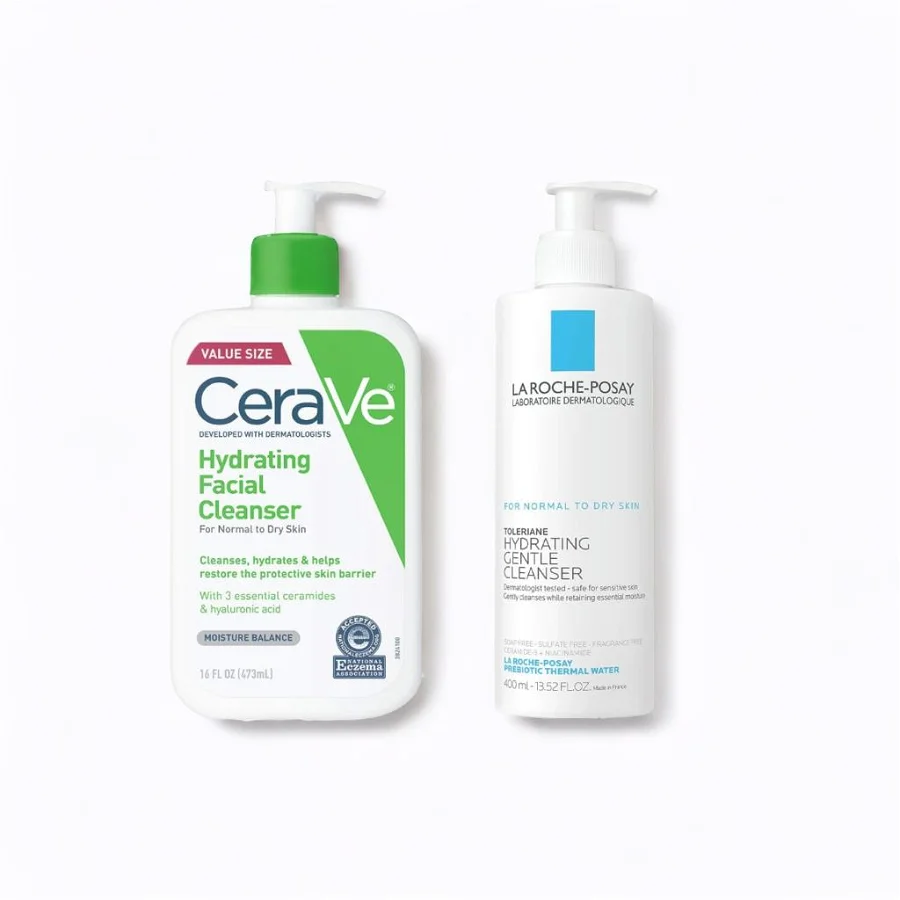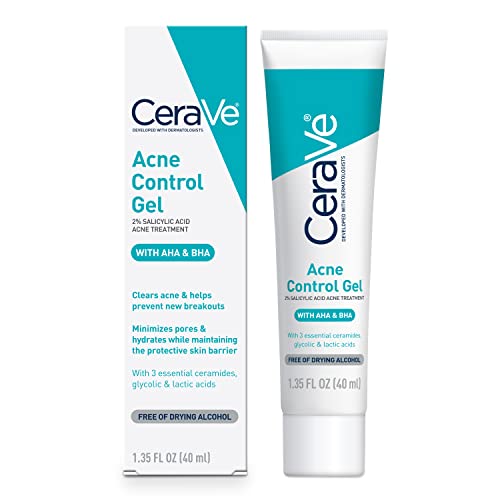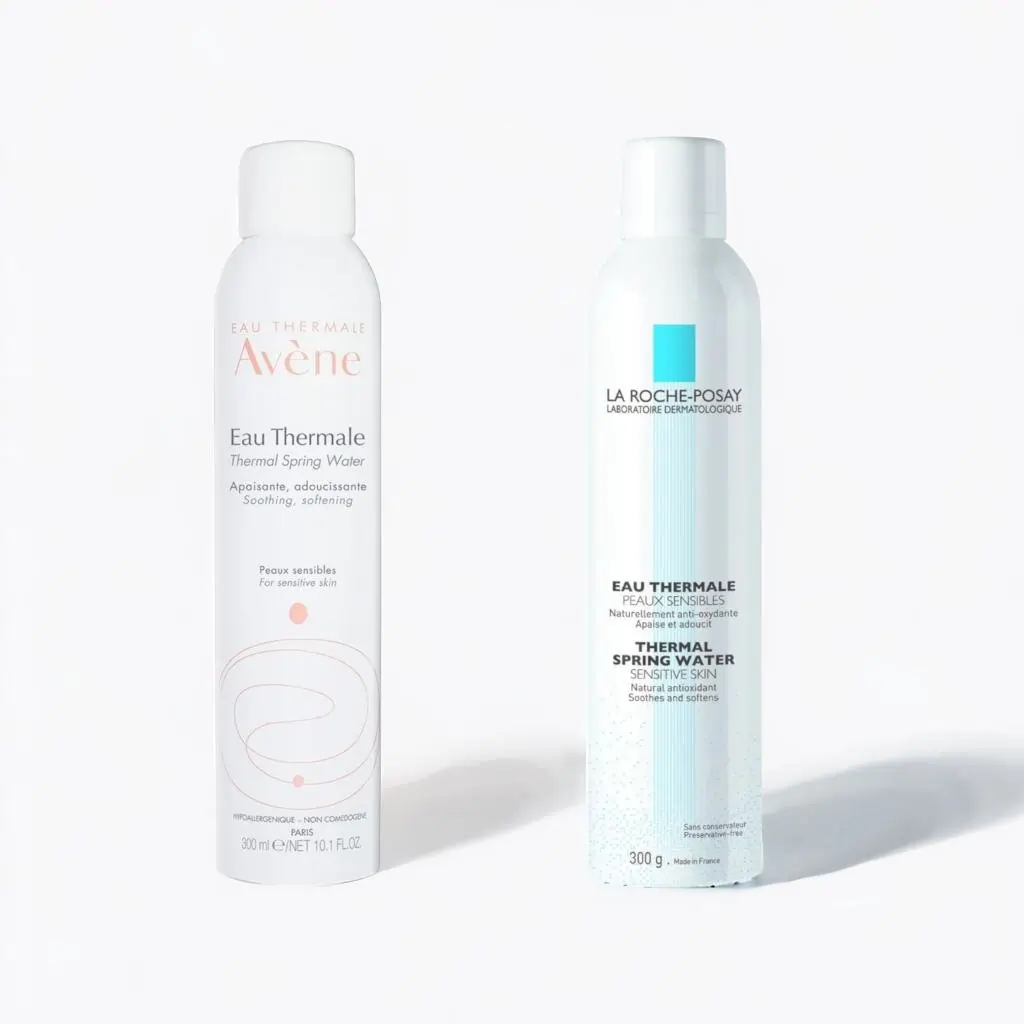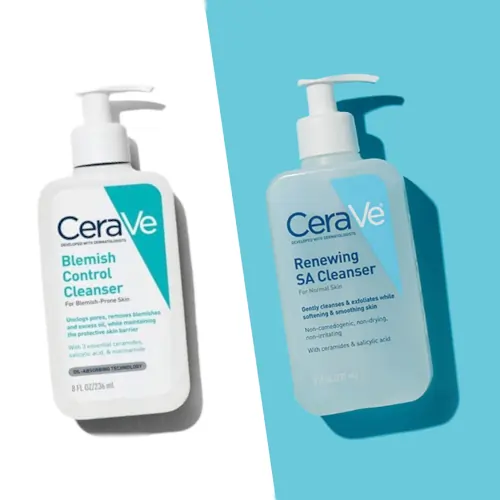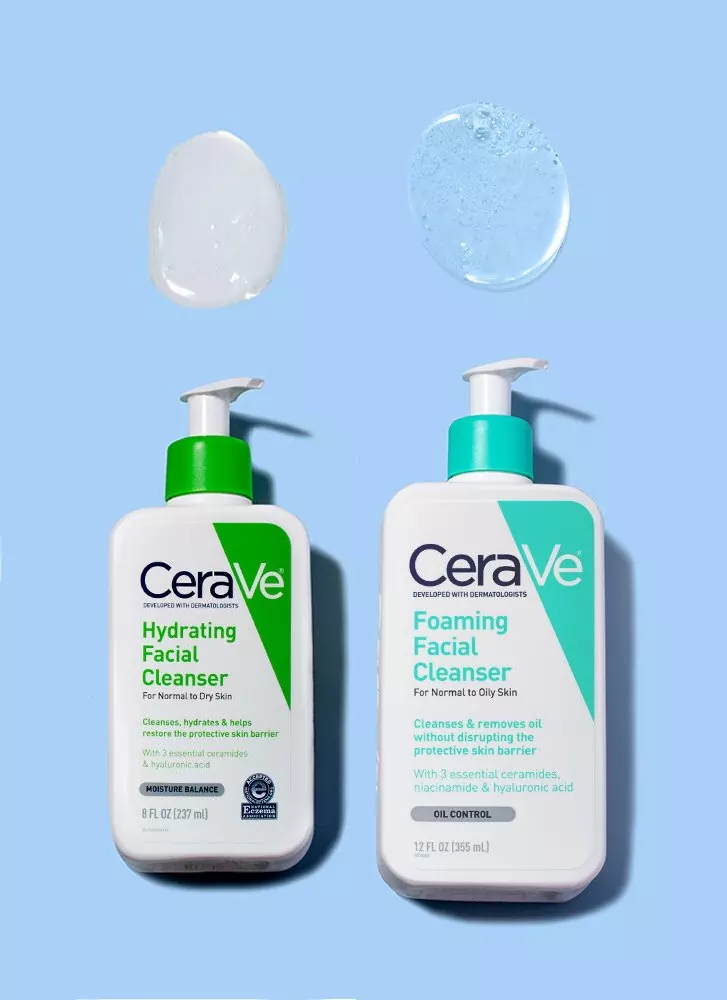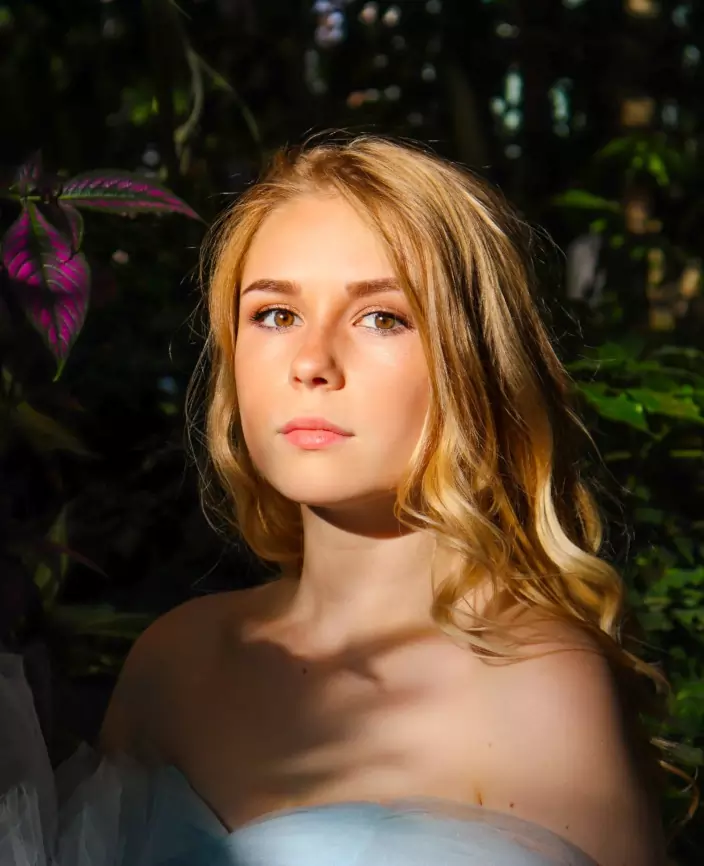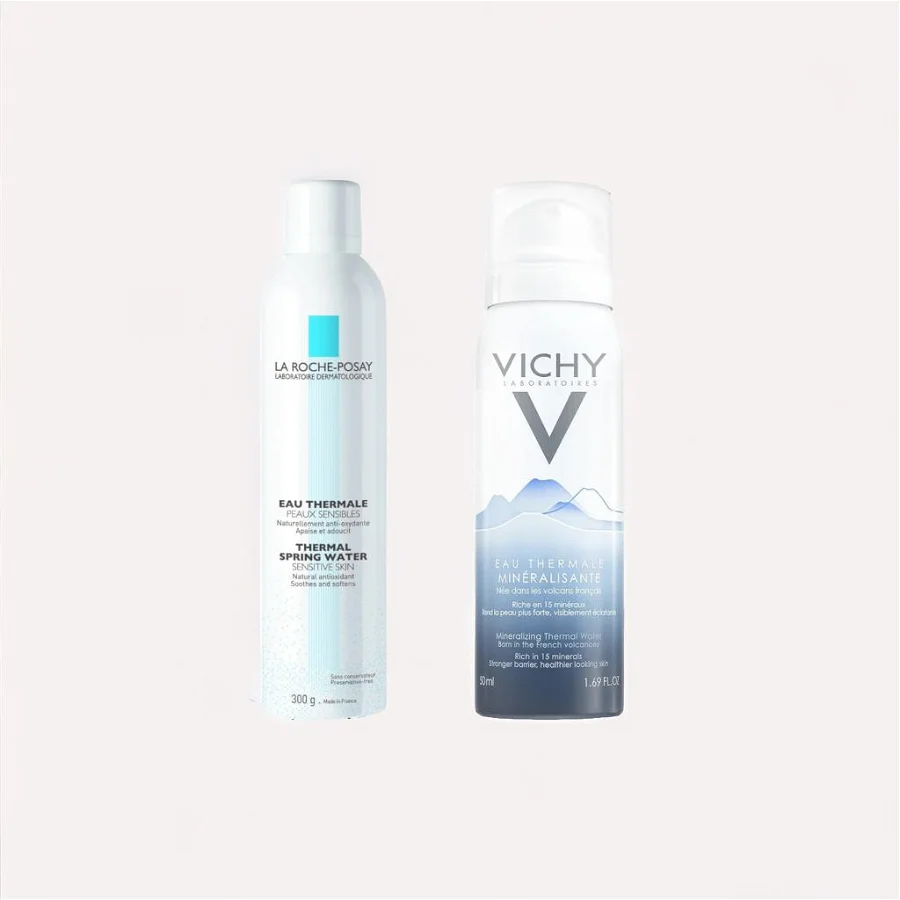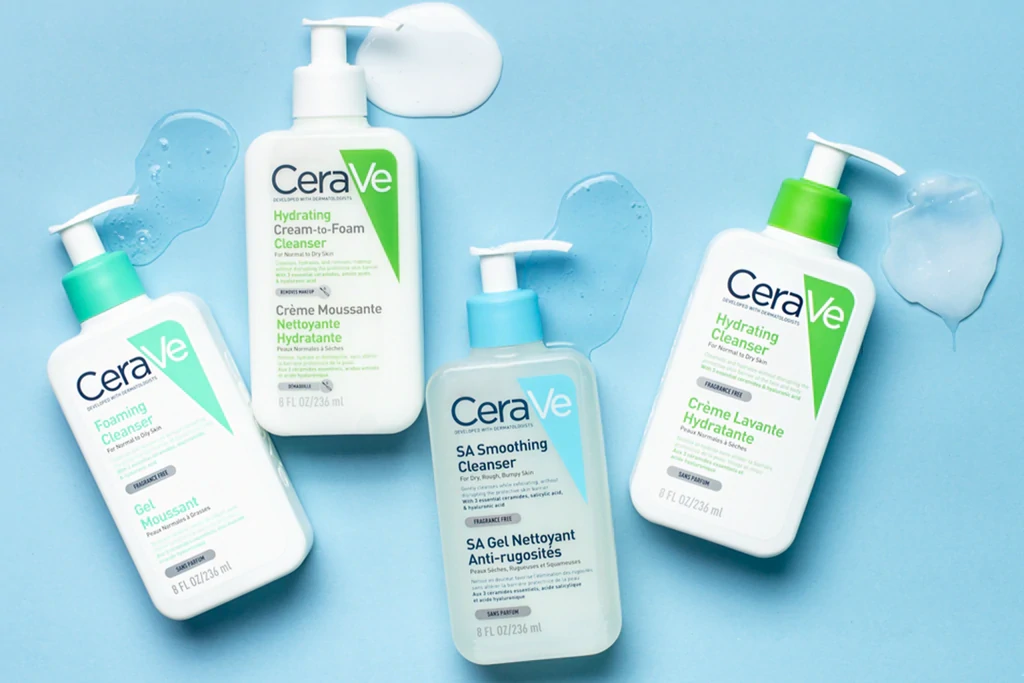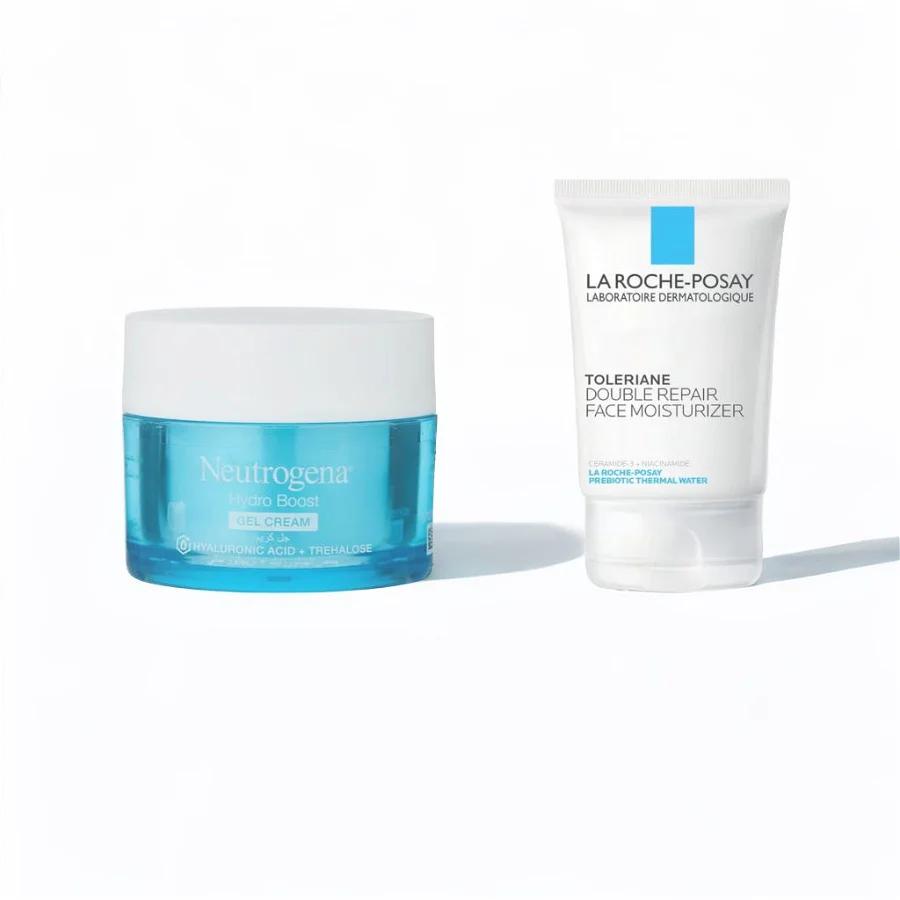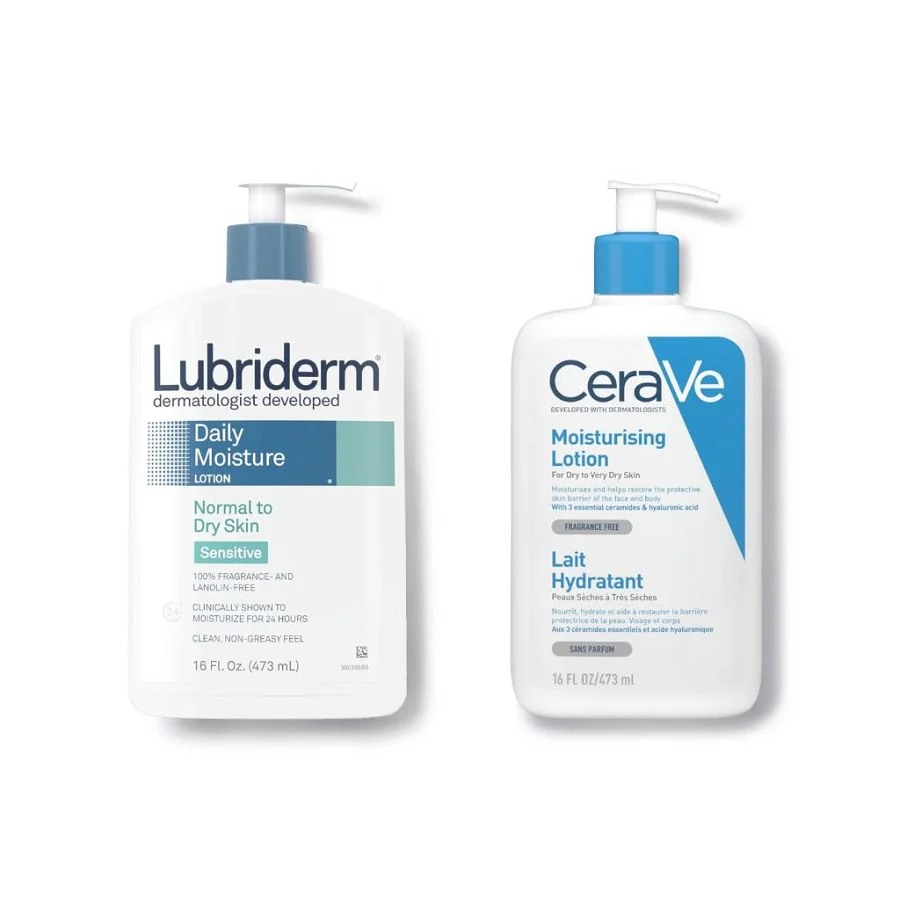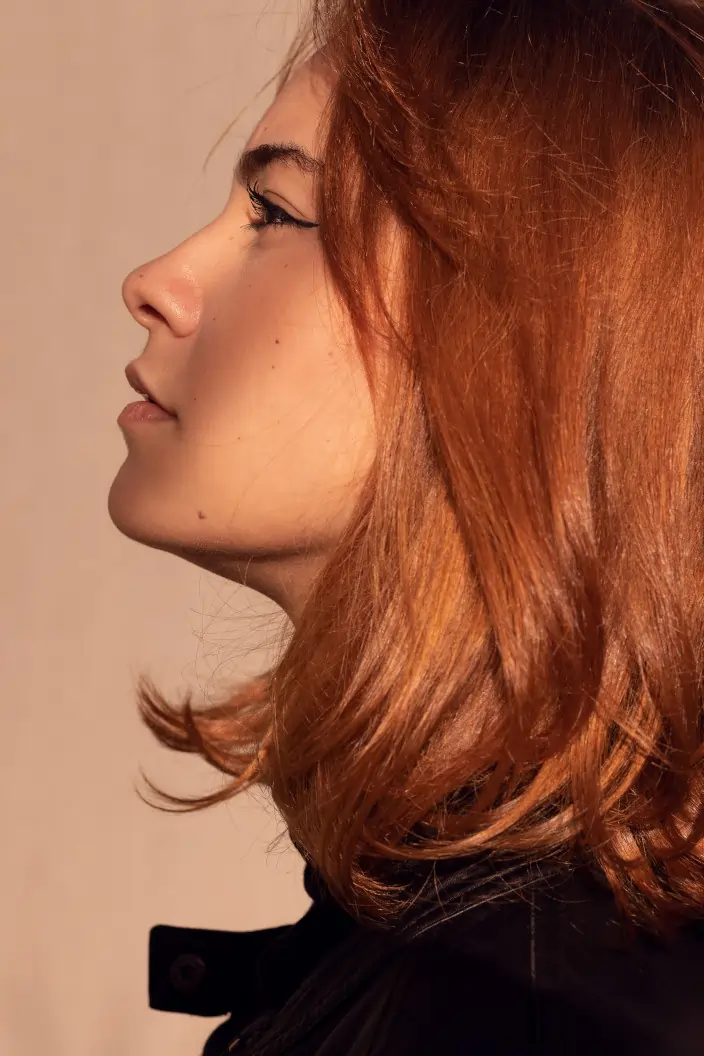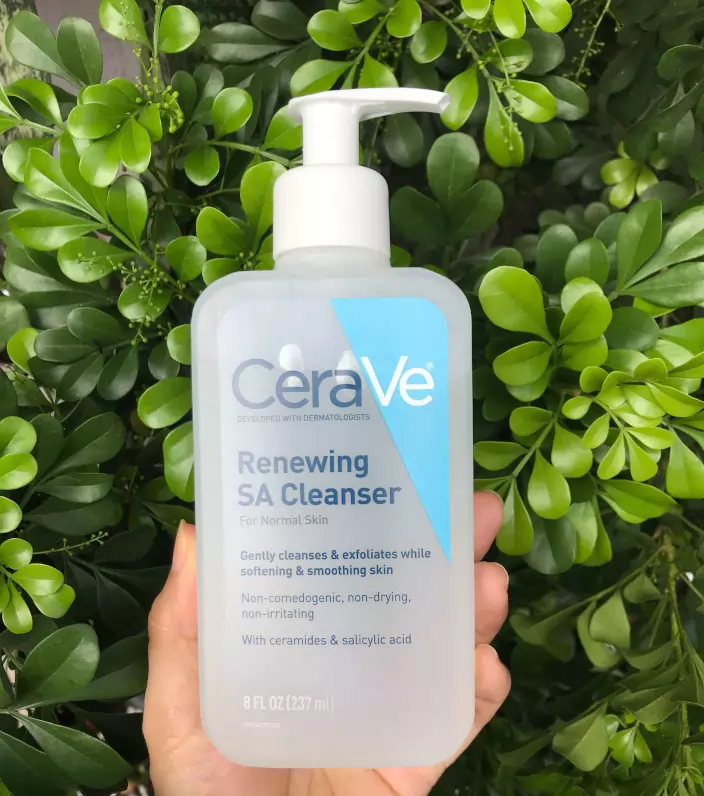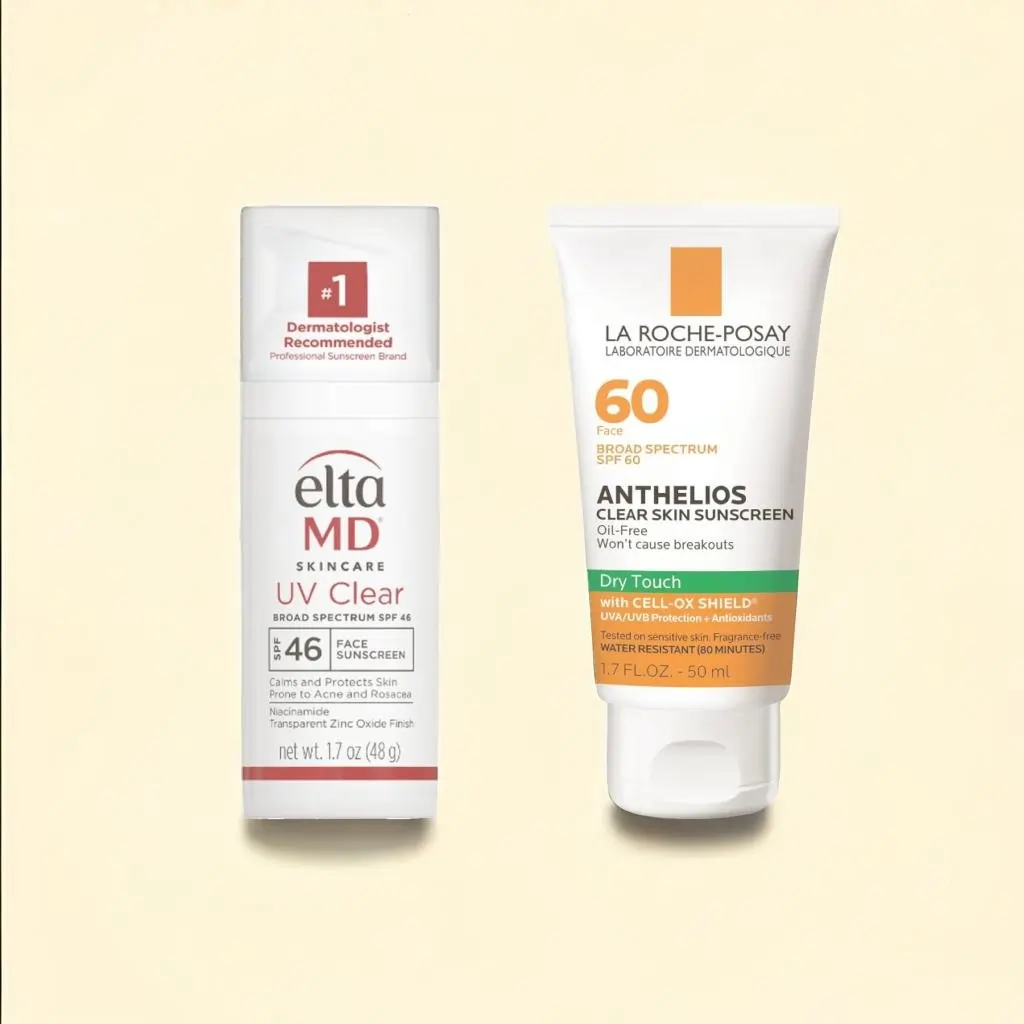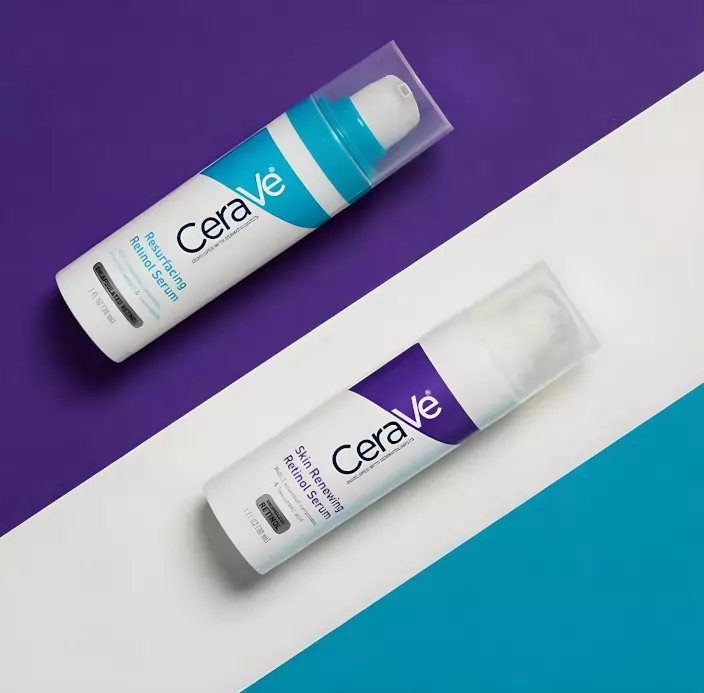
CeraVe and La Roche Posay are two of the most popular beauty brands in the world, so there is a very tricky decision to be made when it comes to choosing between the two.
Today, we will be comparing their best-sellers side-by-side to help decide which is best for you and your skin. CeraVe vs La Roche Posay - let's get into it!
CeraVe vs La Roche Posay Cleanser
When it comes to cleansers, La Roche Posay and CeraVe have a wide variety of fantastic options from which to choose. Keep scrolling to see our picks and comparisons for each skin type.
CeraVe Hydrating Facial Cleanser vs La Roche-Posay Toleriane Hydrating Gentle Cleanser
2024 update: When it comes to choosing a cleanser for normal-to-dry skin, you'll struggle to find two better choices than CeraVe's Hydrating Facial Cleanser or La Roche-Posay's Toleriane Hydrating Gentle Cleanser. Their formulations remaining untouched for the past few years (at least) are testament to their enduring popularity, and thus the comparison between these two stalwarts remains as pertinent as ever.
The La Roche Posay Toleriane Hydrating Gentle Cleanser is a daily cleanser that works perfectly for normal, dry, and sensitive skin types. Featuring ingredients such as ceramides, prebiotic thermal spring water, and niacinamide, it effectively removes dirt, makeup, and all other types of impurities from the face without stripping your skin's natural barrier.
The CeraVe Hydrating Facial Cleanser boasts practically identical qualities, with the only surface-level difference being that it contains hyaluronic acid in place of La Roche Posay's glycerin + niacinamide combo.
It is definitely worth noting that both formulas have been developed with dermatologists, are non-comedogenic, non-irritating and fragrance-free.
La Roche Posay's Cleanser does have the slight advantage of being the better option for sensitive skin types, primarily due to the presence of selenium-rich thermal water in the formula which acts as an antioxidant that protects the skin from stressors.
Honestly, you'll have a hard time splitting the two on any factor other than this, but it is the reason as to why we recommend La Roche Posay's Toleriane Hydrating Gentle Cleanser over CeraVe's (albeit very marginally).*
*While we previously blanketly recommended La Roche Posay over CeraVe here, we feel it's important to note that more often than not, the decision should come down to *your* skin's specific needs rather than an objective difference on paper. As such, here is our updated advice for 2024:
If you have sensitive skin prone to irritation, La Roche-Posay's cleanser may be the more preferable option for you. On the other hand, CeraVe's is ideal for those with particularly dry skin.
Q: "But what about if I have dry AND sensitive skin?"
A: Err on the side of treating sensitivity and opt for La Roche Posay.
Q: "But what about if I have relatively normal skin and I just want a good cleanser?"
A: Both cleansers are great, you'll be happy with whichever one you choose.
Q: "I have oily/combination skin, what about me?"
A: If you have acne-prone skin, skip to the next section on cleansers for acne. Otherwise, you might want to try La Roche-Posay given its inclusion of oil-regulating Niacinamide.
Pros
Great for sensitive skin
Cons
More expensive than CeraVe
What makes it special? This gentle creamy face wash cleanses skin of impurities, respecting your skin's natural moisture barrier and pH, helping to restore skin comfort and retain essential moisture. Formulated with the skin nourishing trio of prebiotic thermal spring water, niacinamide, and ceramide, it ensures your skin looks healthy and radiant day after day.
Pros
Great value with hyaluronic acid
Cons
Less suitable for sensitivity
What makes it special? A cleanser can remove dirt, makeup and other debris, but a hydrating cleanser, like CeraVe Hydrating Facial Cleanser, can do all that without disrupting the skin's natural protective barrier or stripping the skin of its natural moisture. Created with dermatologists, CeraVe Hydrating Facial Cleanser is a gentle face wash with ingredients like ceramides and hyaluronic acid that work to restore the skin's natural barrier to help the skin lock in moisture.
CeraVe Renewing SA Cleanser vs La Roche-Posay Effaclar Purifying Cleansing Gel
As you'll be well aware, while some cleansers are perfect for all skin types (i.e. our previous comparison), some are made especially for specific skin concerns. The La Roche Posay Effaclar Purifying Cleansing Gel and CeraVe Renewing SA Cleanser are two such examples, catering specifically for oily and blemish-prone skin. Thanks to their inclusion of active ingredients, they work to exfoliate the skin, nullify breakouts, and support the general healing process of your skin.
2023 update: Since publishing this guide, CeraVe has released a new cleanser for acne-prone skin: the Acne Control Cleanser. Check out our CeraVe Renewing SA Cleanser vs Acne Control Cleanser comparison to find out all the similarities and differences.
The Effaclar Purifying Cleansing Gel contains Zinc PCA, which has sebum-regulating and antimicrobial properties that make it particularly useful for oily skin prone to acne. Combination skin also benefits from its combination of moisture-binding and sebum-reducing properties. And, because both Zinc and PCA occur naturally in our bodies, Zinc PCA is also suitable for sensitive skin!
The Renewing SA Cleanser on the other hand contains the BHA (Beta Hydroxy Acid) Salicylic Acid. It's well-known for reducing acne by exfoliating the skin and keeping pores clear of dirt and excess sebum, however it is also known to be on the more astringent side of things (and potentially irritating). CeraVe have included skin-nourishing ceramides, niacinamide, and hyaluronic acid in the formula to offset any irritation, though.
Both products have an extremely impressive number of rave reviews online, and given that with these sorts of products the only thing that matters are the results, it is nigh on impossible to separate them. Again, it comes down to intricacies regarding skin type: if you are prone to redness and irritation, you will probably prefer La Roche Posay, whereas if you are mainly struggling with congested skin, you will most likely see better results with CeraVe.

La Roche-Posay Effaclar Purifying Foaming Gel Cleanser
A fresh, foaming, gel facial wash specially formulated for oily, blemish-prone skin.
Pros
Gentle for sensitive skin
Cons
Higher price point
What makes it special? This minimalist formula contains the best of La Roche Posay's creations – designed, tested and re-tested for its efficacy and mildness on sensitive skin. It gently cleanses your skin thanks to its high tolerance foam enriched with Zinc PCA, lifting dirt, grime and sebum away from the surface of the skin without disrupting its delicate balance.
Pros
Contains vitamin D
Cons
Can be drying
What makes it special? CeraVe Renewing SA Cleanser provides gentle, non-irritating exfoliation without harsh microbeads that can scratch your skin. Suitable for use on your face and body as well as acne-prone skin. It not only exfoliates the skin, but with three essential ceramides, hyaluronic acid and niacinamide, it also helps soften and smooth the skin without disrupting its protective barrier. This formula is also non-comedogenic, fragrance-free and enriched with antioxidant vitamin D.
CeraVe vs La Roche Posay Moisturizer
Both priding themselves in extreme tolerance for sensitive and problematic skin, you would be hard-pressed not to find a moisturizer by CeraVe or La Roche Posay that your skin absolutely loves.
With that said, there are some notable differences between their moisturizers that can - and should - influence your purchasing decisions; keep scrolling to learn more.
CeraVe Daily Moisturizing Lotion vs La Roche-Posay Toleriane Double Repair Moisturizer
When beauty brands decide to work with health professionals during the formulation of a product, you know that the product will stand out. This is the case with both the La Roche Posay Toleriane Double Repair (AKA the Toleriane Sensitive Creme) and CeraVe Daily Moisturizing Lotion, with each boasting ingredient lists that scream out that dermatologists were behind their creation.
Both contain ceramides, which help to support your natural moisture barrier protecting the skin. Furthermore, each moisturizer contains powerful moisturizing agents to restore your skin's hydration levels.
The similarities go on and on, including their cult-following. However, the pricing is the key differentiator here. While both can be purchased around the ~$20 mark, you will be receiving only 2.5 oz. of La Roche Posay's product relative to CeraVe's 19 oz. - that's a mighty difference (almost 8x more product)!
In summary, the La Roche Posay Toleriane Double Repair is the more expensive option of the two, but it also offers additional skin-nourishing benefits on top of the usual moisturizing duties (thanks to the inclusion of niacinamide and prebiotic spring water). The CeraVe Daily Moisturizing Lotion, on the other hand, only really offers moisturizing benefits, but for the price it's very hard to argue against the amazing value on offer.
Erring on the side of quality over quantity, our choice lies with La Roche Posay here.
Pros
Superior moisturizing benefits
Cons
Reports of pilling
What makes it special? Formulated with a high concentration of La Roche-Posay prebiotic thermal water and a trio of delightful moisture barrier replenishing ingredients, this dermatologist-tested moisturizer immediately comforts and hydrates your skin from the very first application. In theory, its lightweight cream texture absorbs as easily into the skin as its CeraVe counterpart, but please be aware that there are several reports of pilling, leading us to deduce that this product would best suit those with naturally smooth skin.
Pros
Great value for money
Cons
Basic moisturizing only
What makes it special? CeraVe Daily Moisturizing Lotion is a lightweight, oil-free moisturizer that helps hydrate the skin and restore its natural barrier. Formulated with 3 essential ceramides that work together to lock in skins moisture and help restore your skin's protective barrier. MVE technology encapsulates ceramides to ensure efficient delivery within the skin's barrier and slow release over time. It leaves the skin feeling comfortable, and is gentle on the skin as it provides 24-hour hydration.
CeraVe AM Facial Moisturizing Lotion vs La Roche-Posay Toleriane Double Repair Face Moisturizer UV
If you're looking for something more along the lines of a day cream (i.e., a moisturizer that also shields your skin from environmental stressors, and sits nicely under makeup), then this match-up has your name all over it. CeraVe's AM Facial Moisturizing Lotion and La Roche Posay's Toleriane Double Repair UV both promise to hydrate and restore your skin's natural moisture barrier while offering sun protection.
It's no surprise why each of their claims are practically identical, either, given that both products contain the same hero ingredients: ceramides (maintains the skin's natural barrier), niacinamide (helps calm the skin), and glycerin (helps hydrate the skin).
Where they begin to diverge is that La Roche Posay goes one step further in the hydration department, introducing Silica, Dimethicone, and their signature Thermal Spring Water into the mix, whereas CeraVe instead goes one step further in the sunscreen department, including a mix of chemical and mineral sun protectant ingredients.
On the topic of sun protection, La Roche Posay's Toleriane Double Repair UV moisturizer features only chemical sunscreen ingredients, most controversially: Avobenzone. If the mere reading of this word hasn't already sent shudders down your spine, then you're most likely unaware that Avobenzone is widely regarded as unsafe for humans because it degrades in the sun resulting in harmful free radicals being released into the body.*
*That said, the data regarding this claim has not been fully substantiated by the FDA yet, so the choice to use products containing Avobenzone comes down to personal preference.
This little fact alone does probably explain why CeraVe's day cream is recommended by The SCF, and La Roche Posay's isn't, though.
Finally, it is worth pointing out that because CeraVe's contains the mineral sun protectant Zinc Oxide, it isn't quite as lightweight as La Roche Posay's (no matter how much they try to convince you otherwise with their "InvisibleZinc" claim). This matters particularly if you're planning to wear makeup over your day cream, or if you're really not a fan of a slight white cast being left behind after application.
Ultimately, the decision boils down to whether or not you're more keen on reliable, safe sun protection—in which case CeraVe's Lotion is for you—or whether you prefer the idea of better moisturizing properties and a better base for makeup (and you're okay with the uncertainty surrounding Avobenzone)—in which case go for La Roche Posay.
Pros
Lightweight refreshing texture
Cons
Contains controversial avobenzone
What makes it special? Toleriane Double Repair Face Moisturizer UV is formulated with a high concentration of La Roche-Posay prebiotic thermal water, ceramide-3, niacinamide, and glycerin, providing up to 48hr hydration and restoring skin's natural protective barrier. This dermatologist-tested face moisturizer with SPF has a lightweight, refreshing texture that is easily absorbed into the skin to immediately restore the feeling of skin comfort in all skin types, including sensitive ones.
Pros
Safe zinc oxide protection
Cons
Slight white cast
What makes it special? CeraVe AM Facial Moisturizer is a morning skincare multitasker, featuring 3 essential ceramides that work together to lock in skins moisture and help restore your skin's protective barrier, hydrating hyaluronic acid and soothing niacinamide, plus their patented MVE technology that encapsulates ceramides to ensure efficient delivery within the skin's barrier and slow release over time. Offering Broad Spectrum sunscreen, it features InVisibleZinc Technology (microfine zinc oxide) that spreads easily and evenly without leaving a chalky residue.
CeraVe PM Facial Moisturizing Lotion vs La Roche-Posay Toleriane Ultra Night Cream
One of the main issues that comes with having sensitive skin is finding the right beauty products that don’t cause further irritation (been there, done that, got the postcard to prove it). The La Roche Posay Toleriane Ultra Night Cream is one such hidden gem amongst a sea of duds. The product was formulated especially for sensitive, intolerant skins, including those that are prone to allergy, and the purpose of the cream is to help reduce skin sensitivity overnight.
Speaking of hidden gems (or rather not-so-hidden gem?), the CeraVe PM Facial Moisturizing Lotion is another nighttime skincare product that soothes and hydrates your skin while you sleep. Just as with the rest of CeraVe's skincare range, it features ceramides, niacinamide, and hyaluronic acid.
Being nighttime beauty products is not the only similarity between the two products, though. They both feature exactly 24 ingredients (sharing 7 of which in common), and they both work to calm and hydrate the skin during its most receptive hours. Moreover, the two products function tertiarily as anti-aging products and also brighten the skin.
They are not without their differences, however. Most importantly, the La Roche Posay Toleriane Ultra Night Cream is best for sensitive skin types; this includes intolerant skin, allergy-prone skin, and ultra-sensitive skin. It is particularly soothing, and attempts to reduce the sensitivity of your skin overnight. The CeraVe PM Facial Moisturizing Lotion acts as a regular overnight moisturizing cream, primarily for those with normal, oily, and dry skin types.
The CeraVe PM Facial Moisturizing Lotion also features unique MVE (Multivesicular Emulsion) technology that sees the continual release of moisturizing ingredients to the skin all night for sustained hydration. This technology is not available in the La Roche Posay Toleriane Ultra Night Cream, and this is one of the key advantages of CeraVe's PM cream over the La Roche Posay Night Cream.
The La Roche Posay night cream is your best bet if you have ultra-sensitive or allergy-prone skin, whereas CeraVe's PM lotion is the one for you otherwise.

La Roche-Posay Toleriane Dermallergo Night Cream
A moisturiser for ultra sensitive, intolerant or allergy-prone skin to hydrate and reduce skin sensitivity overnight.
Pros
Reduces skin sensitivity overnight
Cons
Higher cost per ounce
What makes it special? Specifically formulated for every sensitive, reactive skin prone to dryness, tightness, redness, itchiness or burning, it soothes, hydrates and reduces skin sensitivity night after night. Enriched with Neurosensine, Niacinamide, Carnosine, Vitamin A, plus soothing Thermal Spring Water, it helps skin improve its natural barrier and instantly soothes irritated skin.
Pros
MVE technology for hydration
Cons
Less suitable for allergies
What makes it special? Created with dermatologists, CeraVe PM Facial Moisturizer features three essential ceramides, hyaluronic acid and niacinamide in an oil-free, non-comedogenic formula that can hydrate and calm the skin while helping to restore the skin's natural barrier. This rich, yet lightweight night cream uses their patented MVE Delivery Technology to deliver a steady stream of much-needed moisture throughout the night.
CeraVe Moisturizing Cream vs La Roche-Posay Lipikar Balm AP+
The La Roche Posay Lipikar Balm AP+ is one of the leading moisturizing body creams in the market at the moment for dry to very dry skin. It performs prebiotic action on the skin, leading to relief from rough and dry skin, while providing 48 hours of hydration. The product is endorsed by the National Eczema Association and has been declared safe and suitable for children as young as two weeks.
The CeraVe Moisturizing Cream is the more popular option of the two, despite being ever-so-slightly more expensive. You will struggle to find many negative reviews online for either of these products.
Your skin's lipid barrier protects your skin from damage and dehydration. However, when that barrier is compromised, the skin gets really rough, dries out easily, becomes irritated easily, and there's nothing to stop nasty pollutants, bacteria, or environmental stressors from getting in and causing havoc. This is what these body creams correct, especially thanks to their respective shea butter and ceramides content. The cream restores the skin’s natural barrier and mitigates TEWL (Trans-epidermal Water Loss), consequently keeping your skin hydrated for longer.
In summary, there is not an awful lot of difference between the two, and we seriously can't form a definitive conclusion one way or another here. The price difference is negligible at best, and they are both quality, dermatologist-recommended products, without any harsh or concerning ingredients. The two both cater to the same type of skin and offer effective hydration and relief for dry to very dry skin. You will love whichever one you choose.

La Roche-Posay Lipikar AP+ Triple Repair Moisturizing Cream
A hydrating, soothing balm for dry skin suitable for the whole family.
Pros
24h itch protection
Cons
More expensive option
What makes it special? Lipikar Balm AP+ helps restore the skin's natural barrier to protect it from irritants. A high concentration of Niacinamide helps immediately soothe the skin and provide 24h itch protection. The formula is also enriched with Aqua Posae Filiformis to help rebalance the skin's microbiome to help reduce the frequency of dry skin flare-ups.
Pros
Excellent value and size
Cons
Thick consistency
What makes it special? CeraVe Moisturizing Cream includes 3 essential ceramides that work together to lock in skin's moisture and help restore your skin's protective barrier. MVE technology encapsulates ceramides to ensure efficient delivery within the skin's barrier and slow release over time, supporting your protective skin barrier long after you've finish applying.
CeraVe Healing Ointment vs La Roche-Posay Cicaplast Baume B5
Having sensitive skin or skin that is chronically irritated and damaged can be a real headache, which is the motivation for the formulation and manufacture of the La Roche Posay Cicaplast Balm B5. The product contains ingredients such as dimethicone, madecassoside, shea butter, and Vitamin B5 (hence the name “Balm B5”) that combine to provide relief to dry, chafed, or damaged skin. The CeraVe Healing Ointment is another competing balm that fuses ingredients such as hyaluronic acid, petrolatum, and ceramides to also calm upset skin.
Despite the similarity in purpose, that's just about where the commonalities cease. Starting with the price, the La Roche Posay Cicaplast Balm B5 costs double the price of the CeraVe Healing Ointment for half the amount of product (1.5 oz. vs 3 oz.). This is easily justifiable, though, due to the number of extra actives that the Cicaplast Balm includes relative to CeraVe's. Furthermore, La Roche Posay's balm seems more geared towards it being a multi-purpose treatment for the whole family (specifically citing that it is suitable for kids and babies as well as adults); CeraVe makes no such claim, although it is still certainly multi-purpose.
In summary, both products are top-notch as they - once again - feature incredibly high-quality ingredients. If you're happy to splurge a little extra for the extra benefits, La Roche Posay Cicaplast Balm B5 is by far our preference here. However, the CeraVe Healing Ointment is the more purse-friendly option that still delivers fantastic results.
Pros
Non-sticky light texture
Cons
Much smaller quantity
What makes it special? Emollients have a terrible reputation of feeling greasy; not this balm, though, as it has an uber-light, non-sticky texture that is a dream to apply. Five fundamental soothing & protective (see: anti-bacterial!) ingredients comprise the balm's dual-functionality, ensuring that sensitive, irritated, and inflamed skin is soothed and skin comfort is restored, granting you the relief you have been longing for.
Pros
Budget-friendly healing balm
Cons
Limited extra actives
What makes it special? CeraVe Healing Ointment is formulated to temporarily protect, soothe and hydrate skin as it recovers from cracking, chafing and extreme dryness. It is lightweight yet intensely hydrating and features three essential ceramides and hyaluronic acid in a moisturizing base. It is also non-comedogenic, suitable for all skin types, and free of fragrance, dyes and lanolin to minimize the risk of irritation from these ingredients.
CeraVe vs La Roche Posay Sunscreen
Allow us to introduce the CeraVe Hydrating Mineral Sunscreen Face Sheer Tint and the La Roche Posay Anthelios Mineral Tinted Sunscreen.
You might be wondering why we've chosen their 'tinted' sunscreens to compare side-by-side, as opposed to one of the many other pairs we could've reviewed. Well, firstly, these two happen to be by far the most popular options from either brand. Secondly, unlike untinted SPF, tinted sunscreens offer blue light protection in addition to the usual UVA/UVB protection. And finally, they serve as a way to avoid the annoying white cast that most other sunscreens leave behind (which is a biggie, and most likely explains why they're more popular than the untinted alternatives).
While both sunscreens appear incredibly similar on the surface—being tinted, mineral sunscreens with an emphasis on soothing sensitive skin—the differences begin to show almost immediately upon inspection of their ingredients.
CeraVe's Hydrating Mineral Sunscreen Face Sheer Tint contains the active mineral sun protectants Titanium Dioxide and Zinc Oxide, whereas La Roche Posay's Anthelios Mineral Tinted Sunscreen contains just Titanium Dioxide. This is a bigger deal than it might first seem, because while Titanium Dioxide is effective at blocking UVB and short-wave UVA rays, it is much less effective at blocking long UVA rays. That's why combining it with Zinc Oxide—which is effective at blocking long UVA rays—is an absolute must.
Even though the La Roche Posay sunscreen boasts an SPF of 50, the fact that it relies solely on Titanium Dioxide is a big red flag, since it allows significant UVA damage while preventing UVB rays from giving you any natural cues to get out of the sun. Despite CeraVe's sunscreen offering a lower SPF of 30, it actually offers more broad-spectrum protection, and for this reason alone we're ready to recommend CeraVe's over La Roche Posay's.
On the topic of inactive ingredients, both sunscreens offer a nice range of your typical skincare superstars such as ceramides, niacinamide, and hyaluronic acid in CeraVe's, and vitamin E, silica, and dimethicone in La Roche Posay's. This feels like a bit of a moot point, though, given that our verdict has already been reached.
In terms of sun protection (which is what we're buying sunscreen for, right?), CeraVe's Hydrating Mineral Sunscreen Face Sheer Tint is objectively the better choice. Other perks of this sunscreen include that it is hypoallergenic, non-comedogenic, fragrance-free, paraben-free, and suitable for sensitive skin. We love this sunscreen, and the thousands of other rave reviews out there tell us we're not alone on this one.

CeraVe Hydrating Mineral Sunscreen SPF 30 with Sheer Tint
SPF 30 Tinted Hydrating Mineral Sunscreen for Face.
Pros
Broad spectrum protection
Cons
Lower SPF rating
What makes it special? Protect your skin, while getting a healthy glow without any white cast. CeraVe Hydrating Mineral Sunscreen Broad Spectrum SPF 30 Face Sheer Tint provides UVA/UVB protection with 100%-mineral titanium dioxide and zinc oxide, forming a barrier on the surface of your skin to reflect the sun's rays. Non-greasy and suitable for sensitive skin, this mineral sunscreen with tint seamlessly blends into all skin tones.

La Roche Posay Anthelios 50 Mineral Tinted Ultra Light Sunscreen Fluid 50ml/1.7oz
Tinted mineral sunscreen for face.
Pros
Lightweight matte finish
Cons
Only titanium dioxide protection
What makes it special? This lightweight 100% mineral tinted face sunscreen with titanium dioxide was developed for sensitive skin. The fast-absorbing texture leaves a tinted matte finish on skin for a healthy glow. It is formulated with Cell-Ox Shield® technology: broad spectrum UVA/UVB protection with antioxidants.
CeraVe vs La Roche Posay Serum
The pièce de résistance of any FEMMENORDIC-approved skincare routine is a delightfully skin-nourishing serum. Here, we will pit a few against each other to determine the absolute best.
CeraVe Hyaluronic Acid Serum vs La Roche Posay Hyalu B5 Serum
With the trend of La Roche Posay and CeraVe evidently being two brands with missions to improve your skin's moisture levels with their products, it should come as no surprise that they each offer fantastic hydrating serums: the CeraVe Hydrating Hyaluronic Acid Serum and the La Roche Posay Hyalu B5 Serum.
Right out of the gate there are similarities galore. Each serum contains pure Hyaluronic Acid (HA)—as you would expect from a couple of products advertised as 'hydrating'—as well as Vitamin B5 for its skin-soothing properties, Dimethicone to further reduce moisture loss, and Glycerin to help the skin absorb water.
Where they begin to differ is texture, which tells us a lot about the intended function of each serum. CeraVe's HA Serum is creamy—indicating the presence of occlusive ingredients—which implies that the focus of this product is to assist the skin's moisture barrier. La Roche Posay's feels a lot more like a typical serum—indicating the absence of occlusive ingredients—which means the focus of the product is on penetration; in this case, to hydrate deep below the skin's surface.
A quick inspection of their ingredients list confirms our deductions, with CeraVe's serum additionally containing ceramides and cholesterol—alongside several thickening emulsifiers—which play a vital role in maintaining a healthy skin barrier. La Roche Posay's Hyalu B5 Serum instead contains two different sized molecules of the aforementioned Hyaluronic Acid, with a view to maximize penetration and hydration of every layer of the dermis.
So, if you're struggling to decide between the two, then the dilemma ultimately boils down to this: If you're just looking for a regular serum to add some hydrating goodness to your existing routine, your best bet is the Hyalu B5 Serum from La Roche Posay. However, if you're seeking more of a 'treatment' for the underlying cause of dryness (i.e. an underperforming moisture barrier), then CeraVe's zerum is for you.
It's also worth noting that CeraVe's serum is slightly more suitable for sensitive skin, because La Roche Posay's actually contains a couple of clean skincare no-nos: fragrance, and denatured alcohol. That said, both products are non-comedogenic, paraben-free, and allergy tested.
Pros
Barrier-restoring ceramides
Cons
Creamy texture
What makes it special? CeraVe Hydrating Hyaluronic Acid Serum helps bind moisture to your skin's surface, smoothing it and providing up to 24 hours of hydration. With vitamin B5 and three essential ceramides that work together to lock in skins moisture and help restore your skin's protective barrier. CeraVe Hydrating Hyaluronic Acid Serum provides your skin with much-needed moisture and more.
Pros
Deep penetrating hydration
Cons
Contains fragrance and alcohol
What makes it special? The minimalist formula contains the best of La Roche Posay's creations – designed for sensitive skin and all of its needs. Hyaluronic acid effectively plumps the skin and in doing so, reduces the appearance of fine lines and wrinkles, as well as improving skin hydration and texture. This formula contains two different sized molecules of Hyaluronic Acid. The larger molecule works on the surface of the skin to reduce wrinkles and re-plump the skin. The smaller molecule is able to penetrate more deeply into the skin to increase skin volume.
CeraVe Skin Renewing Vitamin C Serum vs La Roche-Posay Vitamin C Serum
Vitamin C helps with collagen production, treats hyperpigmentation, hydrates the skin, reduces redness, smoothes the complexion, and reduces the appearance of fine lines. Both the CeraVe Skin Renewing Vitamin C Serum and the La Roche Posay Vitamin C Serum contain this fantastic little ingredient in its purest, most potent form: L-ascorbic Acid.
L-ascorbic Acid is naturally found in the skin, so it is readily bioavailable, meaning that it is absorbed into the skin with ease. However, it is relatively unstable meaning it is liable to oxidize (i.e. go off) before even reaching the skin, so there are some requirements of the solution it's contained in for it to be effective. The first of which is the concentration; 10-20% is widely regarded as 'optimal', and clearly both of these serums are within this range (albeit on the lower end) at 10% each.
Secondly, the pH (i.e. how acidic the solution is). A pH of ≤3.5 ensures maximum stability and permeability—anything higher will cause it to lose effectiveness (e.g., at a pH of 8 you end up losing ~40% of the useful vitamin C content). Neither brand is entirely clear about their serums' pH, but our tests indicate them to be around a pH of 6. This is great news for those with sensitive skin (since 6 is quite a neutral pH, which will minimize irritation), but for those looking to maximize your skin's vitamin C intake, it's time to look elsewhere.
Moving swiftly on from this, it's also worth noting that each of these serums boasts slightly differing supporting formulas. While both contain Glycerin and Hyaluronic Acid to improve skin hydration, the CeraVe Skin Renewing Vitamin C Serum also contains Ceramides and Vitamin B5 for further emphasis on hydration, whereas the La Roche Posay Vitamin C Serum additionally contains Salicylic Acid to help clear and refine the appearance of pores and Neurosensine to help soothe the skin.
So, to reiterate: if you're okay with the fact that neither of these serums are absolutely optimal in terms of delivering vitamin C (e.g. if you have fairly sensitive skin), then the choice boils down to whether you're more a fan of CeraVe's signature focus on the moisture barrier (great for dry skin types), or the extra brightening oomph that La Roche Posay's brings with the inclusion of Salicylic Acid (great for oily skin types).
Pros
Gentle for dry skin
Cons
Suboptimal pH level
What makes it special? This gentle, yet effective lightweight vitamin C serum with three essential ceramides also helps to restore your protective skin barrier, and includes moisturizing hyaluronic acid, and soothing vitamin B5 (pantothenic acid) to help improve skin hydration. Plus, MVE technology continually releases moisturizing ingredients for all-day hydration.
Pros
Includes brightening salicylic acid
Cons
Higher price point
What makes it special? This anti-aging vitamin c face and neck serum leaves skin more radiant, softer, and hydrated. As a result, wrinkles look visibly reduced and skin texture and tone are more even and refined. This serum combines concentrated 10% pure vitamin c, salicylic acid and neurosensine for optimal effectiveness while also being suitable for sensitive skin.
CeraVe Skin Renewing Retinol Serum vs La Roche-Posay Retinol B3 Serum
If you're searching for the holy grail of anti-aging skincare, then you're on the right track if you're finding products containing retinoids such as retinol. Retinol serums are incredibly effective for improving the appearance of fine lines, wrinkles, skin texture and radiance, thanks in large part to retinol's unique skin resurfacing action.
Both the CeraVe Skin Renewing Retinol Serum and La Roche Posay Retinol B3 Serum contain 0.3% pure retinol. This is certainly on the lower end of the potency scale, but this just means that it's suitable for those with sensitive skin and newcomers to retinoids that aren't quite sure of what their skin can handle yet. If you're looking for something with a little more firepower, then it's probably worth looking elsewhere. Honestly, though, 0.3% is plenty for most people.
Given that retinol is inherently irritating to the skin (since the whole point is that it accelerates skin cell regeneration), both brands have taken a stab at easing the blow a bit. CeraVe came up with their so-called 'Encapsulated Retinol', which is essentially pure retinol wrapped in a protective lipid layer which improves its stability, thus increasing tolerance. Clever!
La Roche Posay has instead taken the more traditional approach of letting retinol do its thing while following up with a soothing dose of Vitamin B3 to mitigate the irritation. Both are perfectly valid approaches, but we much prefer the idea of prevention over mitigation. Ergo, CeraVe's Skin Renewing Retinol Serum is our clear winner here without delving insofar as the actives.
For the sake of completion, it's worth noting that we also prefer CeraVe's inactive ingredients list. CeraVe manages to cram ceramides, hyaluronic acid, and niacinamide into practically every product they make, and we're here for it.
Pros
Encapsulated retinol technology
Cons
Lower potency formula
What makes it special? CeraVe Skin Renewing Retinol Serum is a gentle, yet effective daily retinol serum that provides your skin with a variety of anti-aging benefits. This retinol face serum is formulated with ingredients like hyaluronic acid for extra hydration, niacinamide to soothe, and three essential ceramides that work together to lock in moisture and help restore your skin's protective barrier.
Pros
First LRP retinol serum
Cons
Traditional irritation approach
What makes it special? Specifically formulated for those concerned with dehydration, skin irregularities (complexion) and wrinkles, but also searching for a serum suitable for sensitive skin. It is La Roche Posay's first retinol serum to fight the visible signs of ageing with a unique formulation for sensitive skin. Clinically proven to firm, fill & smooth.
CeraVe vs La Roche Posay Acne Treatment
First and foremost, it's worth understanding that while both of these products are treatments for acne, the CeraVe Acne Control Gel is intended to be applied to the entire face, whereas the La Roche Posay Effaclar Duo Spot Treatment is supposed to just be applied to individual spots. This is important, because it has some implications with regards to the concentrations of the formulas and their actives, meaning that this comparison isn't exactly apples-to-apples.
At the heart of practically every worthwhile acne treatment is an exfoliating formula which unclogs pores and removes dead skin cells from the surface of the skin, thereby preventing new breakouts and allowing existing acne to clear up on its own. CeraVe uses a fairly traditional combination of Salicylic Acid (BHA) and Glycolic and Lactic acids (AHAs) for their formula, which is particularly effective because each acid has a different molecular size, meaning you receive treatment at every layer of your skin (i.e. not just the surface layer).
The principle behind La Roche Posay's formula is the same, but it instead contains Benzoyl Peroxide—an anti-inflammatory, anti-septic wonder ingredient—to do the majority of the grunt work. It also contains a derivative of Salicylic Acid known as Capryloyl Salicylic Acid (LHA).
Benzoyl Peroxide is particularly potent, which is great because it yields results, but unfortunately it does come at the cost of potential skin irritation, even if you don't have sensitive skin. This is why La Roche Posay directs you to apply their treatment only to spots and specific problem areas, though this then means that it's only really suitable for those suffering with individual spots that are few and far between. If you're struggling with more widespread acne then it would almost certainly be better to side with CeraVe's all-over gel (or seek an alternative all-over Benzoyl Peroxide treatment).
Though popularity doesn't always correlate with (or guarantee) results, judging by the thousands of rave reviews for each treatment, we'd say they're both fairly safe bets. In fact, both treatments are touted to help skin look noticeably clearer after just 3 days. That said, it's important to choose based on your specific concerns, and consulting a dermatologist is almost always the fastest route to achieve clear skin when it comes to stubborn acne.
Pros
Full-face acne treatment
Cons
Multi-acid formula strength
What makes it special? CeraVe Acne Control Gel is a hydrating, daily acne treatment with 2% salicylic acid that clears acne and helps prevent new breakouts from forming. It also offers gentle exfoliation with alpha- and beta-hydroxy acids (AHA and BHA) that help improve the appearance of pores along with calming niacinamide and barrier-strengthening ceramides.
Pros
Fast results in 3 days
Cons
Spot treatment only
What makes it special? La Roche Posay's best spot treatment for acne reduces the number and severity of acne blemishes, pimples, blackheads and whiteheads. Formulated with 5.5% micronized benzoyl peroxide and micro-exfoliating lipo-hydroxy acid, this acne spot treatment provides fast and visible results in less than 3 days.
CeraVe vs La Roche Posay Eye Cream
Containing Neurosensine (soothing), Niacinamide (soothing), and Shea Butter (moisturizing, soothing), the La Roche Posay Toleriane Dermallergo Eye Cream is clearly formulated with anti-inflammation in mind, but perhaps more importantly: it is specifically for those with allergy-prone skin, and claims to "provide instant & long-lasting comfort, soothe skin, and replenish [the] skin's moisture barrier".
CeraVe's Eye Repair Cream, on the other hand, is formulated for all skin types and claims to "reduce the look of dark circles and puffiness". It also includes Niacinamide for a soothing effect, as well as their trademark trio of essential Ceramides to support the skin's moisture barrier and Hyaluronic Acid for further hydration.
In practice, they both feel extremely hydrating and there is a noticeable, immediate difference in the appearance of the surrounding eye area upon application. The gel-cream texture of La Roche Posay's eye cream serves to enhance its comforting effect, whereas CeraVe's thicker creamy texture makes for a nourishing, replenishing experience.
Fundamentally, the La Roche Posay eye cream works best for those with ultra-sensitive skin. CeraVe's Eye Repair Cream is instead more intended for those of us struggling with puffiness, dryness, and other dehydration-related concerns (with or without sensitive skin).
Pros
Reduces dark circles
Cons
Thicker cream texture
What makes it special? Specifically developed to hydrate and protect the delicate eye area, this lightweight formula - which contains marine and botanical extracts - moisturizes the delicate skin around the eye whilst also leaving the area around the eyes looking brighter and more awake. With 3 naturally occurring ceramides and Hyaluronic Acid which are essential in supporting the skin barrier and retaining moisture, it utilizes patented MVE® delivery technology to help replenish ceramides and deliver controlled, long lasting hydration.

La Roche-Posay Toleriane Dermallergo Eye Cream Soothing Repair Moisturizer
Lightweight, soothing eye cream.
Pros
Ultra-sensitive skin formula
Cons
Double the price
What makes it special? This eye cream is a lightweight soothing fluid formula that is clinically proven to hydrate skin and alleviate signs of skin discomfort and sensitivity around the eyes. Toleriane Dermallergo Eyes is enriched with probiotic derived fractions and neurosensine. Combined with Thermal Spring Water from La Roche-Posay, this formula immediately hydrates and relieves the eye contour area.
The Final Verdict
La Roche Posay and CeraVe are leading beauty brands and their line of products are both known to be of top quality. Hopefully, over the course of this review you arrived at the same conclusions we did, in that they are almost impossible to split in any regard. One overarching theme, however, is that La Roche Posay does seem to be more targeted towards those with sensitive skin, whereas CeraVe is targeted more generally at all skin types.
All in all, you really can’t go wrong with either brand, as is exemplified by their mountains of rave reviews and seriously large cult-followings. We're definitely fans of both, and we're excited to see what other innovations they will bring to the skin-conscious community over the coming years.
